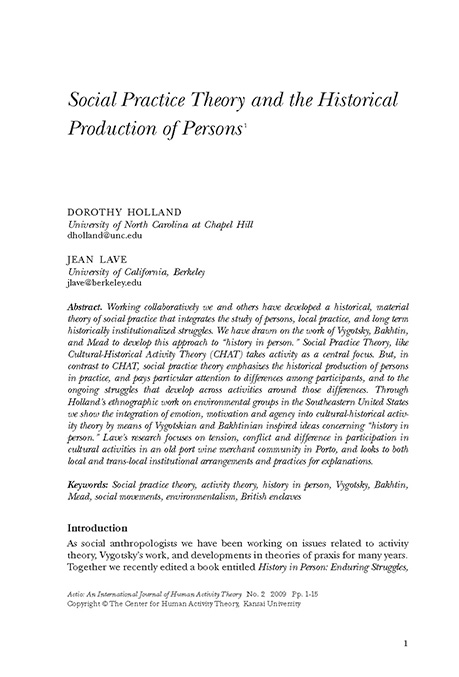
Abstract
Reference

Abstract
Working collaboratively we and others have developed a historical, material theory of social practice that integrates the study of persons, local practice, and long term historically institutionalized struggles. We have drawn on the work of Vygotsky, Bakhtin, and Mead to develop this approach to “history in person.” Social Practice Theory, like Cultural-Historical Activity Theory (CHAT) takes activity as a central focus. But, in contrast to CHAT, social practice theory emphasizes the historical production of persons in practice, and pays particular attention to differences among participants, and to the ongoing struggles that develop across activities around those differences. Through Holland’s ethnographic work on environmental groups in the Southeastern United States we show the integration of emotion, motivation and agency into cultural-historical activity theory by means of Vygotskian and Bakhtinian inspired ideas concerning “history in person.” Lave’s research focuses on tension, conflict and difference in participation in cultural activities in an old port wine merchant community in Porto, and looks to both local and trans-local institutional arrangements and practices for explanations.
References
Engeström, Y. (1999). Activity theory and individual and social transformation. In Y. Engeström, R. Miettinen, & R-L. Punamäki (Eds.), Perspectives on activity theory. New York: Cambridge University Press.
Hart, G. (2002). Disabling globalization: Places of power in post-apartheid South Africa. Pietmaritzburg: University of Natal Press.
Holland, D. (2003). Multiple identities in practice: On the dilemmas of being a hunter and an environmentalist in the USA. European Journal of Anthropology, 42, 23-41.
Holland, D., & Lachicotte, W. (2007). Vygotsky, Mead and the new sociocultural studies of identity. In H. Daniels, M. Cole, & J. Wertsch (Eds.), The Cambridge companion to Vygotsky. Cambridge: Cambridge University Press.
Holland, D., Lachicotte, W., Skinner, D., & Cain, C. (1998). Identity and agency in cultural worlds. Cambridge, MA: Harvard University Press.
Holland, D., & Lave, J.(Eds.) (2001). History in person: Enduring struggles, contentious practice, intimate identities. Santa Fe: School of American Research Press.
Kempton, W., Holland, D., Bunting-Howarth, K., Hannan, E., & Payne, C. (2001). Local environmental groups: A systematic enumeration in two geographical areas. Rural Sociology, 66, 557-578.
Kitchell, A., Kempton, W., Holland, D., & Tesch, D. (2000). Identities and actions within environmental groups. Human Ecology Review, 7, 1-20.
Lave, J. (2001). Getting to be British. In D. Holland, & J. Lave (Eds.), History in person: Enduring struggles, contentious practice, intimate identities.Santa Fe: School of American Research Press.
Lave, J., & Wenger, E. (1991). Situated learning: Legitimate peripheral participation. New York: Cambridge University Press.
Lompscher, J. (2006). The cultural-historical activity theory: Some aspects of development. In P. Sawchuk, N. Durate, & M. Elhammoumi (Eds.), Critical perspectives on activity: Explorations across education, work and everyday life. Cambridge: Cambridge University Press.
Okubo, Y. (2008). “Newcomers” in public education: Chinese and Vietnamese children in a buraku community. In N. Graburn, J. Ertl, & R. K. Tierney (Eds.), Multiculturalism in the new Japan: Crossing the boundaries within. New York and Oxford: Berghahn Books.
Satterfield, T. (2002) Anatomy of a conflict: Identity, knowledge and emotion in old-growth forests. Vancouver: University of British Columbia Press.
Vygotsky, L. S. (1989). Concrete human psychology. Soviet Psychology, 27, 53-77.
Vygotsky, L. S. (1978). Mind in society: The development of higher psychological functions. Cambridge, MA: Harvard University Press.